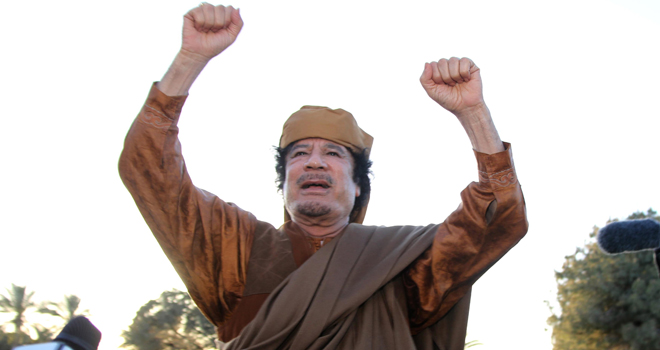Now that Libya’s rebels are declaring they will capture Tripoli by the end of August, the country’s long-time leader, Muammar Qaddafi, must be pondering his future.
There are whispers and rumors that he may be preparing to flee to Tunisia, but the problem he faces there is that the country is about to become a member of the International Criminal Court. That’s the same International Criminal Court that has filed warrants against him and his son, Saif al-Islam, and obliges its members to arrest them should they cross their borders.
As such, Qaddafi’s mind may be turning to the rebels’ earlier offer: that he could cede power and live out the rest of his days in Libya.
But there’s a hitch: those same ICC warrants also make it hard for him to stay in his home country. If the rebels formally take control of Libya then they will be obliged to turn him over to the court.
Technically there’s only one way out, and it’s deeply unsatisfactory for all concerned.
This solution would be for the UN Security Council to invoke a clause in the ICC’s founding statute called Article 16. This bit of international legislation allows the Security Council to postpone any ICC investigation.
The catch is that it has to be renewed on an annual basis. Clearly, this doesn’t suit anybody. Qaddafi would live in perpetual uncertainty, and Security Council members including the US, UK and France would face an embarrassing yearly vote allowing Qaddafi to shrug off responsibility for his actions.
Such an action would be sure to undermine the rationale behind the ICC. Indeed, the International Justice Director at Human Rights Watch, Richard Dicker, recently took to the op-ed pages of the New York Times to warn western powers against giving Qaddafi a “get out of jail free card.”
“Amnesty for mass atrocities,” Dicker wrote, “whether explicit or de facto, has no legal validity internationally.”
Still, William Pace, chief of the Coalition for the International Criminal Court, told TPM it was just about conceivable that the issue could be fudged. “The answer is yes with a lot of asterisks,” he wrote in reply to an email asking whether there were ways out other than Article 16. “The international community is very divided on amnesty issues; the Sec Council is so massively hypocritical and inconsistent in applying international law and principles in their decision-making and in not taking decisions.”
So, it is possible some diplomatic nicety might save Qaddafi, but here’s why it seems unlikely. Whether using Article 16 or not, any decision to grant Qaddafi amnesty would blow open a debate that international lawyers prefer to ignore. For years critics have pointed out that when it comes to prosecuting crimes against humanity, there is often a dilemma: peace or justice? Is it a fair trade to let the perpetrators off the hook if that would bring stability to the situation?
For years the UN in particular has tried to square the circle and claim that there is no problem; that true peace can only come with justice. That’s a view that has perhaps started to take hold in places like Serbia, with the recent high-profile arrests of the Bosnian war criminals Ratko Mladic and Radovan Karadzic. However, amnesty for Qaddafi would show the solution is not always neat.
And so, with very few places to run, and little likelihood of a tranquil life if he stays, Qaddafi has a great incentive to fight on to the bitter end. The grim irony here is that when the UN Security Council requested the ICC’s involvement it was meant to hasten Qaddafi’s departure. The idea was to loosen his control on the army by giving his minions an incentive to disobey orders, or even to rise up and overthrow him. Instead, the court’s warrants may have helped prolong the conflict. Still, this also means Qaddafi may one day find himself standing in the dock. And if the rebels keep their pace up then it could come far sooner than anyone would have expected even only a few weeks ago.









